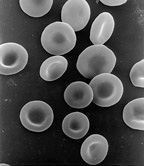
Photo from wikipedia
While the diversity of the human gut microbiota is becoming increasingly well characterized, bacterial physiology is still a critical missing link in understanding how the gut microbiota may be implicated… Click to show full abstract
While the diversity of the human gut microbiota is becoming increasingly well characterized, bacterial physiology is still a critical missing link in understanding how the gut microbiota may be implicated in disease. The current best practice for studying bacterial physiology involves the immediate storage of fecal samples in an anaerobic chamber. This reliance on immediate access to anaerobic chambers greatly limits the scope of sample populations that can be studied. Here, we assess the effects of short-term oxygen exposure on gut bacterial physiology and diversity. We use relative nucleic acid content and membrane integrity as markers of bacterial physiology, and 16S rRNA gene amplicon sequencing to measure bacterial diversity. Samples were stored for up to 6 h in either ambient conditions or in anoxic environments created with gas packs or in an anaerobic chamber. Our data indicate that AnaeroGen sachets preserve bacterial membrane integrity and nucleic acid content over the course of 6 h similar to storage in an anaerobic chamber. Short-term oxygen exposure increases bacterial membrane permeability, without exceeding inter-individual differences. As oxygen exposure remains an important experimental consideration for bacterial metabolism, our data suggest that AnaeroGen sachets are a valid alternative limiting loss of membrane integrity for short-term storage of samples from harder-to-access populations.
Journal Title: PeerJ
Year Published: 2021
Link to full text (if available)
Share on Social Media: Sign Up to like & get
recommendations!